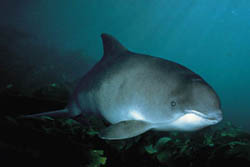
 WWF-United Kingdom is working to promote the identification and designation of marine protected areas in remote offshore waters. A number of potential reserves have been identified - the Dogger Bank, a highly productive site in the southern North Sea - the Rockall Bank and Trough and the Western Irish Sea Front, all rich in marine wildlife - and the Celtic Shelf Break, a seasonal feeding ground for birds, dolphins, whales and large migratory fishes. WWF-UK is raising awareness of fascinating offshore species such as the basking shark -the second largest fish in the world- and the deep sea coral Lophelia.
WWF-United Kingdom is working to promote the identification and designation of marine protected areas in remote offshore waters. A number of potential reserves have been identified - the Dogger Bank, a highly productive site in the southern North Sea - the Rockall Bank and Trough and the Western Irish Sea Front, all rich in marine wildlife - and the Celtic Shelf Break, a seasonal feeding ground for birds, dolphins, whales and large migratory fishes. WWF-UK is raising awareness of fascinating offshore species such as the basking shark -the second largest fish in the world- and the deep sea coral Lophelia.WWF-Sweden supports field projects on the protection of marine species and habitats in the Kattegat, the transition zone between the North Sea and the Baltic. 'Living Kattegat' projects clarify the status and establish long-term conservation measures for seal and harbour porpoise populations. In the archipelago of Väderöarna priority is given to the protection of vulnerable deep water communities of marine invertebrates and demersal fish. WWF-Sweden has also assessed the impact of contaminants, fishing gear, algal blooms and deoxygenation on Norway lobster in order to make recommendations on environmentally sound fishing practices and measures to improve water quality.
WWF-France has been working on the protection and rehabilitation of marine mammals for more than twenty years, focusing particularly on the harbour seal in Normandy as well as the grey seal in Brittany where populations have significantly grown. WWF-France also supports programmes to monitor, manage and protect marine mammal populations. One such project is an ongoing survey of bottlenose dolphins in the Bassin d'Arcachon. In future, while still committed to the protection of such species, WWF-France aims to promote the establishment of marine protected areas and to develop work on marine resources management.